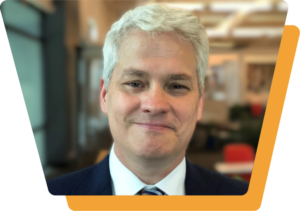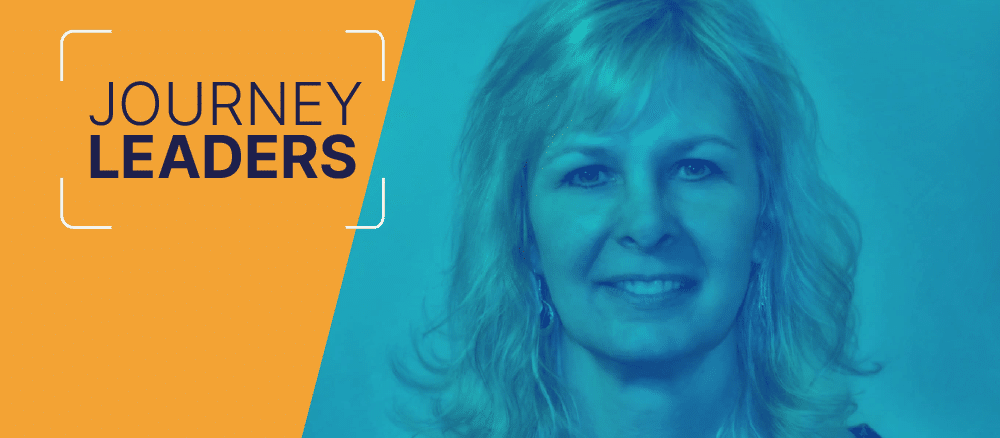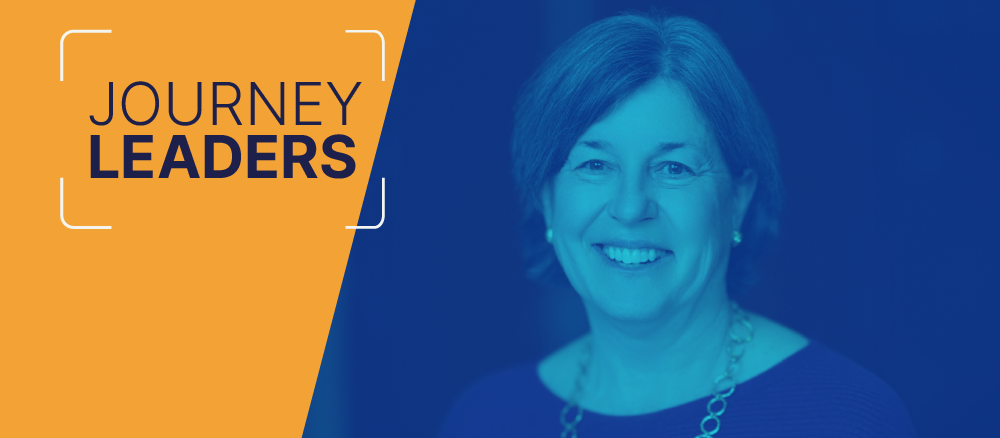Achieving the Dream is pleased to announce that Dr. John O’Brien, president and CEO of EDUCAUSE, will become the newest addition to the ATD Board of Directors, effective July 1. At EDUCAUSE, a nonprofit organization seeking to inspire the transformation of higher education in service to a greater good, Dr. O’Brien oversees a dynamic membership comprising over 2,000 colleges, universities, and organizations across 41 countries. He holds a bachelor’s degree in English from Augustana University, a master’s degree in Anglo-Irish literature from Trinity College Dublin, and a doctorate in English from the University of Minnesota. Throughout his career in higher education, he has served as a faculty leader in instructional technology, deputy chief information officer, and senior vice chancellor of academic and student affairs in the Minnesota State Colleges and Universities system.
We recently got acquainted with Dr. O’Brien in an interview in which he discussed, among other things, his passion for technology innovation in teaching and learning, the synergies he sees in the work of ATD and EDUCAUSE, and the role of data and technology as a strategic asset in higher education.
What compelled you to accept the invitation to join the ATD Board of Directors?
I have a lifelong career with community colleges and community-technical colleges. My first job after getting my Ph.D. was at a community college. At the time, like many I’ve talked to, I said, “This is a stop, not my destination.” And then the magical transformational power of these institutions sank in, and I was forever changed and felt privileged to work in the two-year sector. I’m the child of parents who never went to college, so I’ve experienced how higher education changes lives, including mine.
The chance to contribute to the two-year sector now in service to the ATD board and community is a dream come true.
What intersections do you see between EDUCAUSE’s mission and ATD’s mission?
The EDUCAUSE vision statement is “Inspiring the transformation of higher education in service to a greater good,” and, at that fundamental level, I think our two organizations are in perfect alignment. Technology has a key role to play in all the things that two-year colleges care about, especially the student experience and student success. So, I think our two organizations should continue to support each other — and work even more closely together in the future.
Your academic background is in English and literature and, before joining EDUCAUSE as president/CEO, you were a community college president. How did you become interested in the intersection of higher education and technology and leading an organization like EDUCAUSE?
I got my Ph.D. in 1995, just as the internet took hold, and it shaped my understanding of the experience of being a faculty member. I spent my summers “off” (ha ha) learning about how I could use technology to enhance my teaching. I created software in Authorware one summer so that I could give my composition students more feedback on their papers. I believed then, and believe even more strongly now, that technology can play a positive part in teaching and learning. So, I’ve been living at that intersection my entire professional life, and when I learned about the chance to lead EDUCAUSE, that opportunity seemed like a perfect capstone for my career. My passion for technology to serve the greater good animated my first years as a faculty member, and now, in my last higher education leadership post, I am pleased to return to that focus and to work at a national/international level.
ATD Network colleges are known for their strong fundamentals in data and technology to drive equitable student success. What do you see as some of the challenges that colleges are facing in building and sustaining strong technology infrastructures and cultures of evidence?
The enormous challenge for colleges is simply financial. They need to have the funding to invest in data infrastructures and the data systems that can move the needle on the things that matter. And then there’s the challenge of having the bench strength to innovate. The charm and also the curse of our two-year colleges is that they put students first — long before that became a “thing”— and so, at times, technology is not first in line for strategic investments. I think that since the COVID-19 pandemic, college and university leadership has increasingly come to understand that technology is not a utility (the sort of thing you realize you have only when it stops working, like running water) but a strategic asset that makes the difference between achieving institutional goals or not doing so.
Artificial Intelligence is currently a hot button topic in the higher education community. What are your thoughts on the usefulness of AI in supporting transformation around student success as well as challenges associated with it?
I published an article on digital ethics in 2020, so I have been raising concerns about algorithmic bias and discrimination for years, and AI takes these concerns (and privacy and cybersecurity) to a whole new level. Although I am a big science fiction fan, I don’t succumb to dystopian visions of AI. In fact, I call on higher education to lead the way in how we talk about, teach about, and use AI. I don’t know when the “singularity” will happen, but I do know that as we speak, we are probably teaching those students who will be directly involved in creating this brave new AI-powered world. It’s up to higher ed to make sure they complete their education with a firm grasp of the societal and ethical implications of technology.
The COVID-19 pandemic showed the importance of institutional nimbleness and resilience. What advice do you have for leaders in how they might use data and technology to contribute to their ability to adapt quickly to changing circumstances and to their ability to help students thrive?
EDUCAUSE is going to be exploring the concept of resilience as part of our new strategic priorities. For me, the aspect of resilience that’s most meaningful is not withstanding change but, as you note, responding with agility. Our members know that the individual technologies come and go and that what matters is the ability to respond to changing circumstances and exigencies in real time.
Having said all that, I have no doubt that institutions need to make critical investments in data and technology to be successful in the years ahead. For the last few years, we’ve talked about “digital transformation” as a choice, but, in 2024, digital transformation is an imperative. It is particularly an imperative if we are putting students at the center of what we do.
In your opinion, what is the greatest challenge facing institutions of higher education as they work to accelerate equitable student outcomes and build programs that align with the needs of their communities?
The biggest challenge is perhaps the most nuanced. The obstacles to equitable outcomes are so deep and so embedded in our cultural and societal structures that there isn’t an easy answer to your question. I think one of the biggest challenges is knowing how far and wide the roadblocks run and finding the courage and dedication to address them in an intentional way. When I was the provost of the Minnesota State Colleges and Universities system, every year I gave a presentation to the board to show our progress in narrowing the opportunity gap experienced by our students. I have a clear recollection of one slide that demonstrated the particularly distressing situation that in Minnesota, as in other states, these academic performance gaps begin in third grade. The solution to this most vexing and consequential challenge is not only difficult to address but also difficult to comprehend — and the runway toward the solution is a long one.




